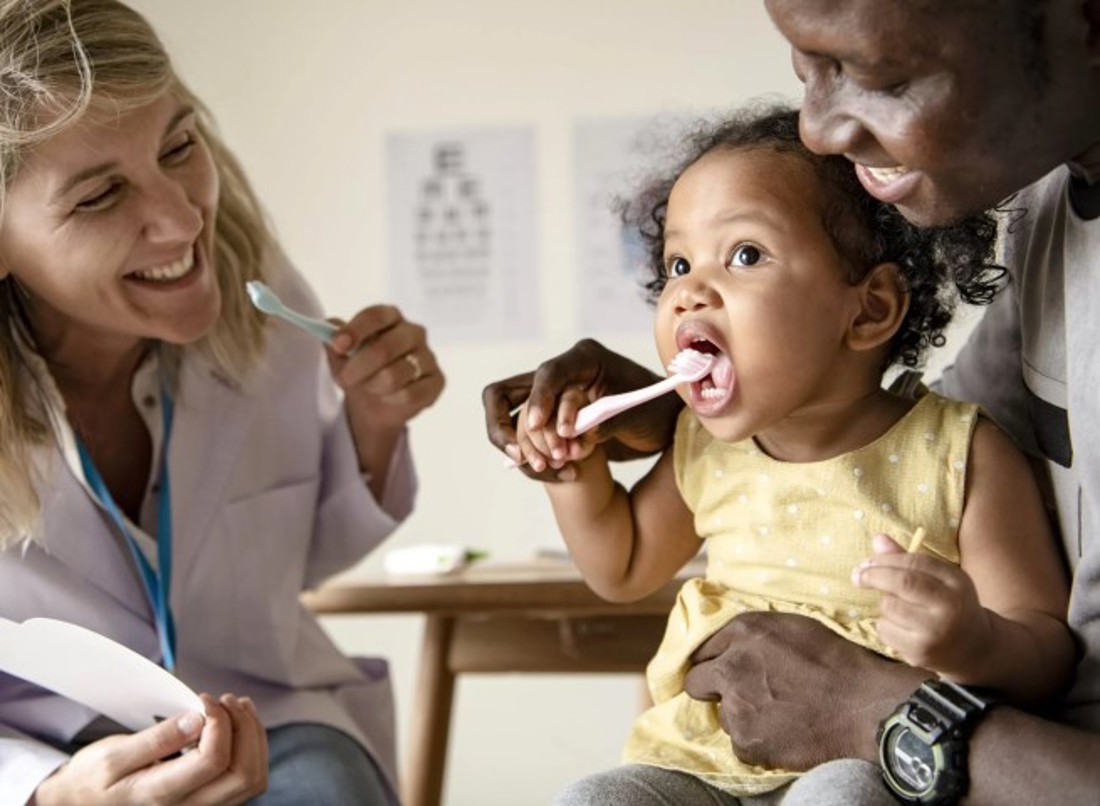How to take care of your baby’s and toddler’s gums and teeth

Did you know that you can start caring for your little one’s oral health when they’re newly born? That’s right! You don’t need to wait for that first tooth to emerge.
And, when your child’s first tooth does come in, there are extra ways to care for it at home with ease. Keeping healthy baby (or primary) teeth decreases their chance of tooth decay and helps their adult teeth come into place with greater success.
Take a look below at how you can look after your child’s gums and teeth.
Taking care of your baby’s gums and first teeth
You should start cleaning your baby’s gums as soon as practical after each feed from when they’re newborn.
How do I take care of my baby’s gums?
Take a clean, moistened (not wet) washcloth or gauze and wrap it around your finger. Then, gently rub the cloth along your baby’s gums after each feed. Ensure you don’t use any toothpaste at this stage – only clean water.
How do I take care of my baby’s first tooth?
To keep their precious teeth healthy from day one, you can introduce a small-headed, soft-bristled toothbrush. Use only clean water (no toothpaste) and gently clean the tooth twice daily while still wiping their gums with the moistened cloth after feeds.
If you’re not yet ready to use a toothbrush, you can also take the clean washcloth or gauze and wipe all sides of the tooth thoroughly twice per day.
Be sure to keep an eye on their gumline as new teeth erupt. You may spot a blue-grey bubble on their gum where a new tooth is cutting in. This bubble is known as an eruption cyst and will typically resolve itself. If you have any concerns, contact your dentist or doctor for their advice.
How do I keep my toddler’s teeth healthy?
When your little one hits toddler age, they’ll have a sweet smile with a few more teeth. Once they’re 18 months old, you can introduce child-strength fluoride toothpaste.
Apply a pea-sized amount of toothpaste (no more) on their soft, child-sized toothbrush and gently brush all surfaces of their teeth in circular motions. Once a few teeth start touching, you can use some dental floss before brushing. Be sure to brush your little one’s teeth twice per day, both morning and night.
While brushing, ensure you use positive reinforcement and talk through what you’re doing; this may help particularly squirmy or resistant children.
When should my child first visit the dentist?
Ideally, your baby should see the dentist within six months of their first tooth arriving or by their first birthday – whichever occurs sooner.[i] By starting these visits early, your child will grow accustomed to the dentist’s office, which will help make future visits more comfortable.
What’s more, these visits provide a great opportunity for you to discuss any questions or concerns you may have.
For extra insight on this topic, read more on what you and your child can expect on their first visit.
Bonus: Eight tips to help prevent baby and toddler tooth decay
Below, we’ve compiled some top tips to help you achieve the best oral care for your little one.
- Avoid letting your child fall asleep with a bottle, even if it contains milk or formula, as these are sugary substances.
- Don’t dip their dummy or bottle teat into sugary substances, like jam or honey. The sugar content can lead to an increased risk of tooth decay when teeth start appearing.
- Avoid sugary drinks, like juice, and snacks – especially snacks that stick to teeth.
- Ensure you provide water over other drinks first.
- Brush any teeth that have come through and floss, when necessary, twice daily.
- Visit the dentist every six months for regular check-ups.
- See the dentist if your child experiences trauma to their teeth (i.e. a chipped tooth).
- Lift your child’s lip to keep an eye on their teeth. Any black, brown or white spots on their teeth could signify tooth decay. Keep in mind that this doesn’t replace a professional examination.
Protect your child’s smile with a check-up and clean today
Is it time for your little one’s first appointment? Or perhaps it’s been a while since their last check-up. Our friendly team of dentists is ready to care for and educate you and your child on the best oral practices.
Book their appointment at a 1300SMILES dentist near you today and set them up for a lifetime of excellent oral habits.
References
- [i] Australian Dental Association. ‘When should my child first see the dentist?’ 2016. Accessed January 2022. https://www.ada.org.au/getattachment/Your-Dental-Health/Resources-for-Professionals/Resources-for-Children-0-11/Children-s-Oral-Health/ADA_OHP_Factsheets_Childrens-Oral-Health-18032019.pdf.aspx [RO1] Accessed January 2022.
- https://www.nationwidechildrens.org/family-resources-education/health-wellness-and-safety-resources/helping-hands/dental-teeth-and-gum-care-for-infants-and-toddlers Accessed January 2022.
- https://www.health.qld.gov.au/news-events/news/how-to-look-after-baby-teeth-dental-oral-health Accessed January 2022.
- https://www.teeth.org.au/babies-and-toddlers Accessed January 2022.